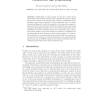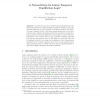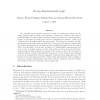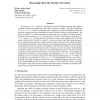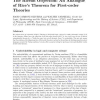125
click to vote
JUCS
2010
15 years 28 days ago
2010
: We introduce a first-order temporal logic for reasoning about branching time. It is well known that the set of valid formulas is not recursively enumerable and there is no fini...
122
Voted
JELIA
2010
Springer
15 years 28 days ago
2010
Springer
Traditionally, a logic program is built up to reason about atomic first-order formulas. The key idea of parametrized logic programming is that, instead of atomic first-order form...
149
Voted
JELIA
2010
Springer
15 years 28 days ago
2010
Springer
In previous work, the so-called Temporal Equilibrium Logic (TEL) was introduced. This formalism provides an extension of the Answer Set semantics for logic programs to arbirary the...
117
click to vote
JAPLL
2010
15 years 28 days ago
2010
We introduce the extended modal logic EML with regularity constraints and full Presburger constraints on the number of children that generalize graded modalities, also known as nu...
126
click to vote
JAPLL
2010
15 years 28 days ago
2010
Two currently active strands of research on logics for multi-agent systems are dynamic epistemic logic, focusing on the epistemic consequences of actions, and logics of coalitiona...
143
click to vote
JAIR
2010
15 years 28 days ago
2010
We present DCL-PC: a logic for reasoning about how the abilities of agents and coalitions of agents are altered by transferring control from one agent to another. The logical foun...
147
click to vote
IGPL
2010
15 years 1 months ago
2010
Fusion is a well-known form of combining normal modal logics endowed with a Hilbert calculi and a Kripke semantics. Herein, fusion is studied over logic systems using sequent calc...
103
click to vote
SAC
2008
ACM
15 years 1 months ago
2008
ACM
In a hypothesis-based approach to digital investigation, the investigator formulates his hypothesis about which events took place, and tests them using the evidence available. A f...
110
click to vote
IGPL
2008
15 years 2 months ago
2008
We propose here an extension of Rice's Theorem to first-order logic, proven by totally elementary means. If P is any property defined over the collection of all first-order t...
135
Voted
TVLSI
2002
15 years 2 months ago
2002
Although simulation remains an important part of application-specific integrated circuit (ASIC) validation, hardware-assisted parallel verification is becoming a larger part of the...

